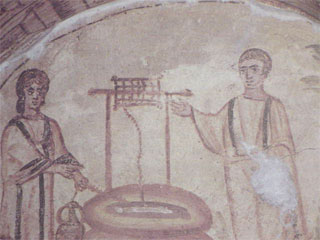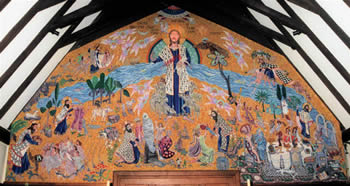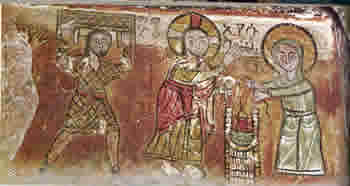The Woman at the Well:
Third Sunday in Lent 2008
For Sunday February 24, 2008
Lectionary Readings (Revised Common Lectionary, Year A)
Exodus 17:1–7
Psalm 95
Romans 5:1–11
John 4:5–42

|
Three years ago when I was in Addis Ababa, a group of us took a day trip to the mountains that circle that capital city of four million people. At the top we prayed over the city, enjoyed the panoramic views, identified buildings in the distance below, and gasped after walking uphill only a short distance in the alpine air. That was the fun part.
The disturbing part was our ascent from the city center at 7,000 feet to the summit at 11,000 feet. As our mini-van belched clouds of blue exhaust, the higher we went the more women and girls we passed carrying loads of firewood on their backs down the mountain. Bent over at the waist, often barefooted, these women carried seventy-five pound bundles of eucalyptus saplings, seven feet wide, back down to the city center about ten miles away, all for a few pennies. The women firewood carriers in Addis are a common sight, so much so that you can read about them in the Lonely Planet guidebook.
I remarked to a friend in the van that if Jesus were alive today and the Gospels were written amongst these women, our New Testament would contain a story about the firewood carriers. In fact, the Gospel reading for this week contains something similar.
Like the woman caught in the act of adultery (John 8), the story of Jesus's encounter with the Samaritan woman at the well (John 4) reminds us that the kingdom He inaugurated is a realm of inclusion not exclusion, dignity not denigration, empowerment rather than exploitation, and affirmation rather than marginalization. His simple request for a drink of water provoked a dialogue with a marginalized woman that teaches us that Jesus does not desire any human being to shrivel and die from a parched soul. Rather, he longs to quench the deepest needs and desires of each one of us with the "living water" of his Spirit.
 |
Jesus speaks with the Samaritan woman at a Well. Catacomb Mural, 4th/5th century AD. |
As Jesus traveled from Judea to Galilee he stopped in the town of Sychar around noon time, tired and thirsty from the journey. There he sat down by a well and asked a Samaritan woman for a drink of water. That Jesus, a Jew, would talk to a Samaritan shocked the woman (4:9). That he would talk to a woman surprised His own disciples (4:27). In fact, through death or divorce, this woman had burned through five marriages and was then living with a boyfriend not her husband (4:18).
When you connect the dots of her story, you realize that in her one person this woman epitomized the many ways that society marginalizes people. Jesus shatters all the taboos that held sway then (and now) — gender discrimination, ritual purity (sharing a drinking cup with a Samaritan), socio-economic poverty (any woman married five times was likely poor), religious hostility, and the moral stigma of serial marriages.
In marked contrast to the male, rabbi, scholar Nicodemus in the previous chapter (John 3), the Samaritan woman displayed spiritual thirst, candor about her past, and genuine insight. She longed not only for literal water, but for the "living water" (4:11) that Jesus offered her, so much so that in her excitement she forgot her water jar when she returned to town (4:28). This thoroughly powerless woman made such a powerful impression upon Jesus and her own neighbors that John included an interesting eyewitness detail about Jesus's itinerary: upon the neighbors's request, "he stayed two days" in Sychar (John 4:40). The woman embraced Jesus as the Messiah, her witness converted many other fellow Samaritans in town (4:39), and she became the cause of the story's punch line: "We no longer believe just because of what you said; now we have heard for ourselves, and we really know that this man is the Savior of the world" (4:42).
These women, the firewood carriers in Addis Ababa and the water collector in Sychar, challenge us with equal parts prophetic vinegar to develop our social consciences and pastoral honey to transform our inner hearts.
 |
Tapestry, Saint Augustine’s Church,
Scaynes Hill, England (1990-1999). |
As in so many Gospel stories about God's alternative community, John 4 subverts and then reverses conventional human wisdom and power relations. Jesus not only engaged a disreputable, ostracized, foreign woman; He cast her as the hero of the story, a symbol of life in His kingdom, and as an ardent witness to his universal lordship. In so doing He warns us of religiosity that turns a deaf ear to the disenfranchised, and which masks an otherwise smug, exclusionary and self-serving faith. How easy it is to succumb to "a diminished religiosity that is characterized by privatized belief systems, devoid of the prophetic and social witness of Jesus and the prophets — ultimately, nothing more than 'small-s' spirituality that is really only ad hoc wish fulfillment or a collection of little self-help techniques we use to take the edge off our materialistic rat-race lives."1
The kingdom that Jesus announced is not one of a privatized faith whose purpose is to guarantee personal peace and affluence. Contrary to so many popular Christian counterfeits, His kingdom does not peddle what the distinguished sociologist Christian Smith of the University of North Carolina (Chapel Hill) aptly laments as "the god of Moralistic Therapeutic Deism" who like a Divine Butler is tasked to make us feel good.2 Rather, Jesus proclaimed that God longs to assuage the deepest needs, spiritual and material, of the morally, spiritually, religiously, and economically least and lost. He invites us to join Him in that service.
 |
Jesus, the paralytic and the Samaritan woman at the well, 13th-century Ethiopia. |
Jesus also offers each one of us the "living water" that is the life-giving action of His Spirit in the deepest recesses of our being. In the beautiful poetry of the Hebrew prophet Isaiah (55:1–3), God welcomes every person, rich or poor, to drink deeply of what He alone can give us and what all that our culture offers — money, jobs, prestige, the proper zip code, the best university degree, or the latest diet — can never satisfy.
Come, all you who are thirsty,
come to the waters;
and you who have no money,
come, buy and eat!
Come, buy wine and milk
without money and without cost.
Why spend money on what is not bread,
and your labor on what does not satisfy?
Listen, listen to me, and eat what is good,
and your soul will delight in the richest of fare.
Give ear and come to me;
hear me, that your soul may live.
To the call of outward service to the vulnerable, these women add the invitation to inward personal renewal contained in the words of Jesus: "Everyone who drinks this ordinary well water will be thirsty again, but whoever drinks the water I give him will never thirst. Indeed, the water I give him will become in him a spring of water welling up to eternal life" (4:14).
[1] Jim Wallis, God's Politics; Why the Right Gets It Wrong and the Left Doesn't Get It (San Francisco: Harper, 2005), p. 36.
[2] "What American Teenagers Believe," in Books and Culture (January-February 2005), p. 10.
For further reflection:
* Consider: in a recent op-ed piece, Jared Diamond observes that consumption rates for the one billion people in the first world are 32 times greater than the consumption rates of the five billion people in the developing world (NYT, January 2, 2008). Has this gluttony of consumption brought us human fulfillment?
* How and where might Jesus call you to break powerful cultural taboos such as those featured in the story of the Samaritan woman?
* For further reading: Frank Anthony Spina, The Faith of the Outsider; Exclusion and Inclusion in the Biblical Story (Grand Rapids: Eerdmans, 2005).
Image credits: (1) BBC News; (2) BibleOrigins.net; (3) Saint Augustine's Church, Scaynes Hill, England; and (4) Christopher Haas, Department of History, Villanova University.





